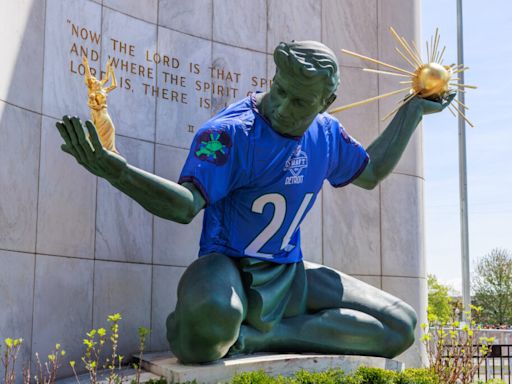Search results
People also ask
Why was Detroit founded?
Who settled Detroit Michigan?
How did Detroit get its name?
Why was Detroit important in the 18th century?
Detroit, the largest city in the state of Michigan, was settled in 1701 by French colonists. It is the first European settlement above tidewater in North America. [1] Founded as a New France fur trading post, it began to expand during the 19th century with U.S. settlement around the Great Lakes.
Learn how Antoine de la Mothe Cadillac founded the city of Detroit in 1701 as a French outpost on the Detroit River, a waterway connecting Lakes Erie and Huron. Explore the history of the French-Indian relationship, the fur trade, the Native population and the British takeover of Detroit.
Four themes from Detroit's past are stressed: the community's political history, Detroit's military importance, the area's economic history, and finally its social history. In reality, each of these four narratives, the context created by national and international events, as well as many other factors come together to create a complex whole.
- Overview
- The city layout
- The people and economy
- Cultural life
Detroit, city, seat of Wayne county, southeastern Michigan, U.S. It is located on the Detroit River (connecting Lakes Erie and St. Clair) opposite Windsor, Ontario, Canada. It was founded in 1701 by a French trader, Antoine de la Mothe Cadillac, who built a fort on the river and named it Fort Pontchartrain du Détroit in honour of his patron (the Fr...
Detroit is situated on a broad, generally flat plain. The downtown area retains vestiges of a hexagonal street pattern laid out early in the 19th century that largely disappeared as the city expanded. Most of the city’s commercial and civic buildings are concentrated in the downtown area near the river and include the City-County Building; Cobo Hal...
Detroit’s population grew dramatically between 1850 and 1950. The city’s industrial growth was a magnet for migrants, at first chiefly European immigrants and later African Americans from the South. The population has declined steadily since the mid-1950s, however, in part because much of the white community moved to the suburbs and also because of the loss of industry. By the early 21st century, some four-fifths of the population was African American.
Detroit has a diversified manufacturing and shipping base, but the city’s economy remains unusually sensitive to the fortunes of the automotive industry. As a result, economic booms and depressions have been felt more heavily in Detroit than in most areas of the country. In addition to motor vehicles and automotive parts, the city’s factories produce machinery (including industrial robots), steel, and chemicals. The service sector has become increasingly important.
Britannica Quiz
Historical USA
Among the colleges and universities in the city are Wayne State University (1868) and the University of Detroit Mercy (1877). Important cultural institutions include Cranbrook Academy of Art in suburban Bloomfield Hills and the Detroit Institute of Arts. The Motown Historical Museum preserves the house where Berry Gordy, Jr., founded the Motown Record Corporation and tells the story of the creation of the classic soul music produced there. The Henry Ford Museum in suburban Dearborn holds an extensive collection of transportation equipment, while the adjoining Greenfield Village contains reconstructions of 19th-century American buildings and exhibits of traditional crafts. Since 1914 Detroit has maintained a symphony orchestra; summer concerts are presented at the Meadow Brook Music Festival in nearby Rochester. Belle Isle Park, in the Detroit River, has a botanical garden, a children’s zoo, and an aquarium. The city’s professional sports teams include the Pistons of the National Basketball Association (NBA), the Tigers of Major League Baseball’s American League, the Lions of the National Football League, and the Red Wings, who have been such a dominant force in the National Hockey League that Detroit was dubbed “Hockeytown, U.S.A.”
Exclusive academic rate for students! Save 67% on Britannica Premium.
- The Editors of Encyclopaedia Britannica
History of Detroit. In the early 18th century Detroit became an important fur-trading post. In 1760, during the French and Indian War, it was surrendered to the British. France’s Indian allies, notably the Ottawa under Chief Pontiac, tried to capture the fort in 1763 but were defeated.
Encyclopedia Of Detroit; Timeline of Detroit. 1600-1699; 1700-1760; 1760-1787; 1787-1820; 1820-1860; 1860-1900; Speakers Bureau; Book Tower Historic Exhibition; 100 Years 100 Stories; History X Design Tour; Podcast. Untold Detroit: Beer | Episode 1; Untold Detroit: Beer | Episode 2; Untold Detroit: Beer | Episode 3; Untold Detroit: Beer ...
Learn about Detroit's rich and diverse history, from its Native American origins to its automotive and musical legacies. Explore the city's landmarks, museums, neighborhoods and cultural influences.


